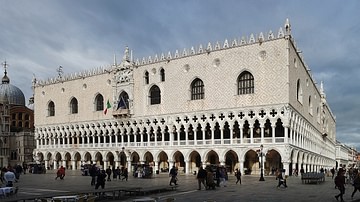Search
Search Results

Article
The Differences Between Byzantine & Armenian Christianity
Although both the Byzantines and the Armenians were Christian, the types of Christianity they professed had important differences that led to a lack of recognition and tensions between the two groups and a considerable part of their relationship...

Image
Seventh Ecumenical Council
An 11th century CE illustration of the Seventh Ecumenical Council which decreed the end of iconoclasm in the Byzantine Church, in September 787 CE. Emperor Constantine VI (r. 780-797 CE) is depicted sitting immediately right of the central...

Definition
Aethelstan
Aethelstan was the first King of England, ruling from 927 to 939. The son of Edward the Elder (reign 899-924) and grandson of Alfred the Great (reign 871-899), he inherited the southern-based Kingdom of the Anglo-Saxons in 924 before capturing...

Definition
Byzantine Government
The government of the Byzantine Empire was headed and dominated by the emperor, but there were many other important officials who assisted in operating the finances, judiciary, military, and bureaucracy of a huge territory. Without elections...

Definition
Johann Eck
Johann Eck (l. 1486-1543) was a Catholic theologian and writer best known for his disputations with Martin Luther (l. 1483-1546) beginning in 1517 and continuing until his death in 1543. Eck maintained the position that, if anyone could determine...

Image
Spread of Christianity Map (up to 600 CE)
Map showing the spread of Christianity, showing both strongly Christianized areas before 325 CE and generally Christianized areas until 600 CE. The map also shows major Christian centers and the cities in which Christian councils were held.

Definition
St. Bartholomew's Day Massacre
The St. Bartholomew's Day Massacre was a widespread slaughter of French Protestants (Huguenots) by Catholics beginning on 24 August 1572 and lasting over two months, resulting in the deaths of between 5,000 and 25,000 people. It began in...

Article
Causes of the Russian Revolution of 1917
There were many causes behind the Russian Revolution of 1917, ranging from the unpopular authoritarian rule of Tsar Nicholas II (reign 1894-1917) to the radical mobilisation of the working class, who wanted better working conditions and more...

Article
Colonial Government in the Spanish Empire
The apparatus of colonial government in the Spanish Empire consisted of multiple levels, starting with the monarchy and Council of the Indies at the top and moving down to the viceroy, audiencias, mayors, and local councils. The system was...

Article
Doge's Palace in Venice
The Doge's Palace, or Palazzo Ducale, in Venice, Italy, was the seat of power of one of the world's most powerful city-states, as the Venetian Republic dominated the Mediterranean for centuries. The bright façade of the palace marks the very...